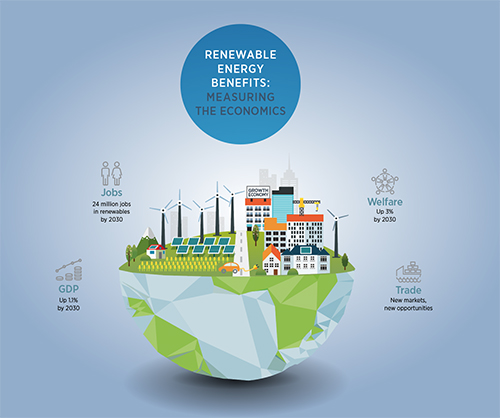Increasing World Renewable Energy Would Boost Global GDP by $1.3 Trillion
Abu Dhabi, U.A.E., 16 January 2016 – Achieving a 36 per cent share of renewable energy in the global energy mix by 2030 would increase global gross domestic product (GDP) by up to 1.1 per cent, roughly USD 1.3 trillion, according to new analysis by the International Renewable Energy Agency (IRENA).
The new analysis provides a first glimpse of the full range of benefits offered by a renewable energy transition.
Renewable Energy Benefits: Measuring the Economics, released at IRENA’s sixth Assembly, provides the first global estimate of the macroeconomic impacts of renewable energy deployment.
Specifically, it outlines the benefits that would be achieved under the scenario of doubling the global share of renewable energy by 2030 from 2010 levels.
“The recent Paris Agreement sent a strong signal for countries to move from negotiation to action and rapidly decarbonize the energy sector,” said Adnan Z. Amin, IRENA Director-General.
“This analysis provides compelling evidence that achieving the needed energy transition would not only mitigate climate change, but also stimulate the economy, improve human welfare and boost employment worldwide.”

Beyond finding that global GDP in 2030 would increase by up to USD 1.3 trillion – more than the combined economies of Chile, South Africa and Switzerland as of today – the report also analyses country-specific impact.
Japan would see the largest positive GDP impact (2.3 per cent) but Australia, Brazil, Germany, Mexico, South Africa and South Korea would also see growth of more than 1 per cent each.
According to the report, improvements in human welfare would go well beyond gains in GDP thanks to a range of social and environmental benefits.
The impact of renewable energy deployment on welfare is estimated to be three to four times larger than its impact on GDP, with global welfare increasing as much as 3.7 per cent.
Employment in the renewable energy sector would also increase from 9.2 million global jobs today, to more than 24 million by 2030.
Canada has the potential to become a major bioenergy exporter, which could partly offset the decline in the trade of some fossil-fuel exports.
A transition towards greater shares of renewables in the global energy mix would also cause a shift in trade patterns, as it would more than halve global imports of coal and reduce oil and gas imports, benefiting large importers like Japan, India, Korea and the European Union. Fossil fuel exporting countries would also benefit from a diversified economy.
“Mitigating climate change through the deployment of renewable energy and achieving other socio-economic targets is no longer an either or equation,” said Amin.
“Thanks to the growing business case for renewable energy, an investment in one is an investment in both. That is the definition of a win-win scenario.”
Renewable Energy Benefits: Measuring the Economics, builds on previous IRENA analysis on the socio-economic benefits of renewable energy and on REmap 2030, a renewable energy roadmap to doubling the global share of renewable energy by 2030.
Download the full report: http://bit.ly/1SQkIyn
Download REmap 2030 materials: http://www.irena.org/remap
Download socio-economic benefits materials: http://revalue.irena.org/publications.aspx
Information on IRENA sixth Assembly: http://bit.ly/1Px3H9E
IRENA Director-General audio/video statement on Economic Benefits: http://we.tl/Slf1h11n5X







